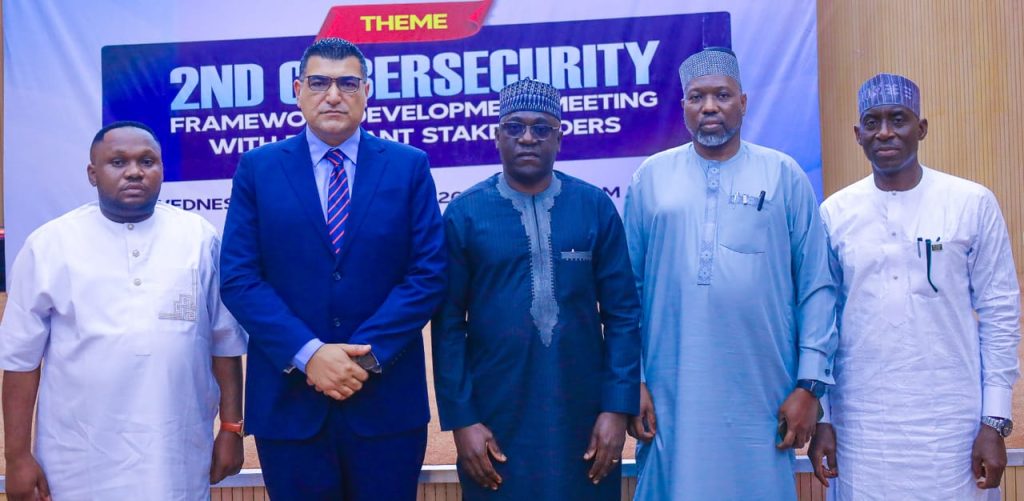
L-R: President, International Youth Parliament, Hon. Promise Digos; Chief Executive Officer, Megamore Wireless Limited, Amin Dayekh; Executive Commissioner, Technical Services, Nigerian Communications Commission (NCC), Abraham Oshadami; Head, Cybersecurity and Internet Governance Department, NCC, Babagana Digima; Chief Executive Officer, Cybernover, Dr. Kazeem Durodoye at the 2nd Cyber Security Stakeholder Workshop Hosted by the Nigerian Communications Commission in Abuja on Wednesday (27th August 2025).
NCC Develops New Cybersecurity Framework to Protect Nigeria’s Digital Infrastructure
The Nigerian Communications Commission (NCC) is advancing a comprehensive cybersecurity framework designed to secure the nation’s digital infrastructure and enhance online safety for consumers.
The framework, which is targeted for implementation by telecom licensees in early 2026, aims to address evolving security challenges and foster a secure digital economy.
Speaking at a second stakeholder development meeting in Abuja, the NCC’s Executive Commissioner for Technical Services, Abraham Oshadami, emphasized the critical need for a “water-tight” approach to counter the growing sophistication of cyber threats. He highlighted that increasing digitalization, rapid data exchange, and modern cyber risks make a robust and adaptive framework more urgent than ever.
Oshadami explained that the threat landscape has expanded beyond traditional concerns of confidentiality, integrity, and data availability. He warned that both state and non-state actors are targeting essential sectors like telecommunications through coordinated attacks on control systems and data integrity.
“As cyberthreats evolve, they endanger not only system performance but also human safety,” he stated, underscoring that disruptions to vital communications infrastructure can have severe real-world consequences.
Given that the telecoms industry is the backbone of Nigeria’s digital economy, Oshadami noted it is both a strategic asset and a prime target, making this framework essential for national development and economic transformation.
The meeting served to present progress made since the initial consultation and to validate key components and implementation strategies of the proposed framework. The NCC reiterated its commitment to an inclusive process, stressing that sustainable cybersecurity requires shared responsibility and strong public-private partnerships.
Dr. Kazeem Durodoye, CEO of CyberNover, the project consultants, presented the framework’s details to stakeholders from telecom licensees and government agencies.
The NCC’s Head of Cybersecurity, Babagana Digima, confirmed that the project is supported by the World Bank. He announced that the framework is expected to be finalized by the end of the third quarter of 2025, with implementation slated to begin in early 2026. The forum aimed to consolidate a shared understanding of the framework’s strategic role in enhancing national cybersecurity preparedness and sector resilience.
